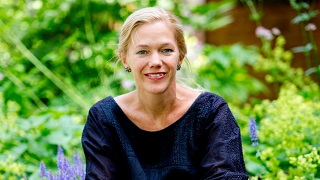De Noorse schrijfster en scenariste Maja Lunde werd geboren in Oslo op 30 juli 1975. Zij behaalde een Masters degree in Media en Communicatie van de Universiteit van Oslo en schreef een proefschrift over de regisseur Nils R. Müller. In 2003 en 2004 werkte zij voor Amandusfestivalen, Noorse filmfestival voor jongeren onder de 20 jaar en ook was zij werkzaam als communicatieadviseur. Lunde maakte haar literaire debuut in 2012 met de roman voor kinderen “Over Grensen”, een thriller die speelt in 1942, waarin de hoofdpersonen proberen om aan vervolging door de nazi’s tijdens de Duitse bezetting van Noorwegen te ontkomen, en naar het neutrale Zweden vluchten. Zij ontving in 2015 de Noorse Prijs van Boekverkopers in 2015 voor haar eerste roman voor volwassenen “De geschiedenis van de bijen”. De rechten werden nog voor verschijnen aan diverse grote internationale uitgeverijen verkocht. Het boek werd een grote bestseller in haar thuisland Noorwegen en bekroond met de Noorse Boekhandelsprijs. Als scenariste ze heeft bijgedragen aan diverse tv-series in Noorwegen.
Uit: The History of Bees (Vertaald door Diane Oatley)
“Like overgrown birds, we balanced on our respective branches, each of us with a plastic container in one hand and a feather brush in the other.
I climbed upwards, very slowly, as carefully as I could. I was not cut out for this, wasn’t like many of the other women on the crew, my movements were often too heavy-handed. I lacked the subtle motor skills and precision required. This wasn’t what I was made for, but all the same I had to be here, every single day, 12 hours a day.
The trees were as old as a lifetime. The branches were as fragile as thin glass, they cracked beneath our weight. I twisted myself carefully, mustn’t damage the tree. I placed my right foot on a branch even further up, and carefully pulled the left up behind it. And finally I found a secure working position, uncomfortable, but stable. From here I could reach the uppermost flowers.
The little plastic container was full of the gossamer gold, carefully weighed out. I tried to transfer invisible portions lightly out of the container and over into the trees. Each individual blossom was to be dusted with the tiny brush of hen feathers, from hens scientifically cultivated for precisely this purpose. No feathers of artificial fibres had proven nearly as effective. It had been tested, and then tested again, because we had had plenty of time, in my district the tradition of hand pollination was more than a hundred years old. The bees here had disappeared back in the 1980s, long before The Collapse, pesticides had done away with them. A few years later, when the pesticides were no longer in use, the bees returned, but by then hand pollination had already been implemented. The results were better, even though an incredible number of people, an incredible number of hands were required. And so, when The Collapse came, my district had a competitive edge. It had paid off to be the ones who polluted the most. We were a pioneer nation in pollution and so we became a pioneer nation in pollination. A paradox had saved us.
I stretched as far as I could, but couldn’t quite reach the blossom at the very top. I was about to give up, but knew I might be punished, so I tried once more. Our pay was docked if we used up the pollen too quickly. And our pay was docked if we used too little. The work was invisible. When at the end of the day we climbed down from the trees, there was no evidence of our work except for the red chalk X’s on the tree trunks, ideally up to 40 trees each day. It wasn’t until autumn came and the trees were laden with fruit that we would know who among us had actually succeeded in their work. And by then we had usually forgotten which trees had been dusted by whom.”

Maja Lunde (Oslo, 30 juli 1975)
